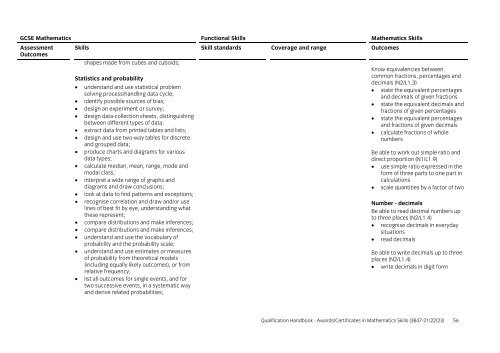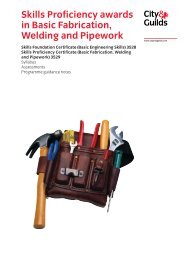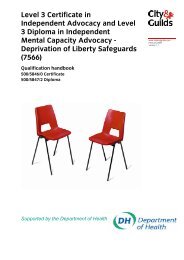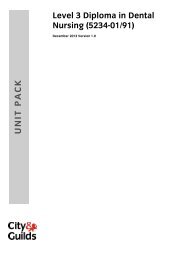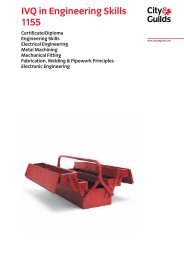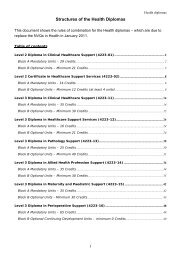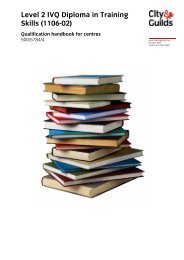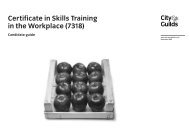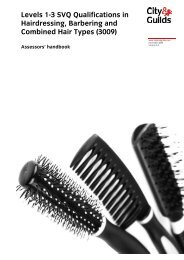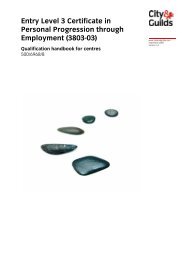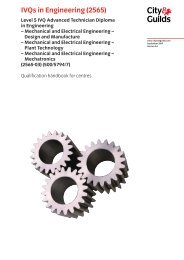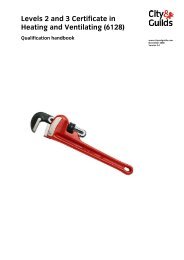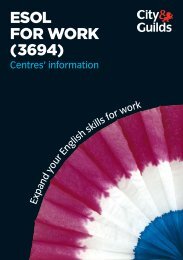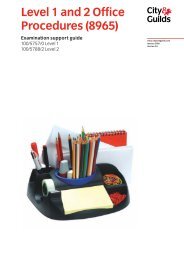Awards/certificates in mathematics skills (3847-21/22 ... - City & Guilds
Awards/certificates in mathematics skills (3847-21/22 ... - City & Guilds
Awards/certificates in mathematics skills (3847-21/22 ... - City & Guilds
Create successful ePaper yourself
Turn your PDF publications into a flip-book with our unique Google optimized e-Paper software.
GCSE Mathematics Functional Skills Mathematics Skills<br />
Assessment Skills Skill standards Coverage and range Outcomes<br />
Outcomes<br />
shapes made from cubes and cuboids;<br />
Statistics and probability<br />
• understand and use statistical problem<br />
solv<strong>in</strong>g process/handl<strong>in</strong>g data cycle;<br />
• identify possible sources of bias;<br />
• design an experiment or survey;<br />
• design data-collection sheets, dist<strong>in</strong>guish<strong>in</strong>g<br />
between different types of data;<br />
• extract data from pr<strong>in</strong>ted tables and lists;<br />
• design and use two-way tables for discrete<br />
and grouped data;<br />
• produce charts and diagrams for various<br />
data types;<br />
• calculate median, mean, range, mode and<br />
modal class;<br />
• <strong>in</strong>terpret a wide range of graphs and<br />
diagrams and draw conclusions;<br />
• look at data to f<strong>in</strong>d patterns and exceptions;<br />
• recognise correlation and draw and/or use<br />
l<strong>in</strong>es of best fit by eye, understand<strong>in</strong>g what<br />
these represent;<br />
• compare distributions and make <strong>in</strong>ferences;<br />
• compare distributions and make <strong>in</strong>ferences;<br />
• understand and use the vocabulary of<br />
probability and the probability scale;<br />
• understand and use estimates or measures<br />
of probability from theoretical models<br />
(<strong>in</strong>clud<strong>in</strong>g equally likely outcomes), or from<br />
relative frequency;<br />
• list all outcomes for s<strong>in</strong>gle events, and for<br />
two successive events, <strong>in</strong> a systematic way<br />
and derive related probabilities;<br />
Know equivalencies between<br />
common fractions, percentages and<br />
decimals (N2/L1.3)<br />
• state the equivalent percentages<br />
and decimals of given fractions<br />
• state the equivalent decimals and<br />
fractions of given percentages<br />
• state the equivalent percentages<br />
and fractions of given decimals<br />
• calculate fractions of whole<br />
numbers<br />
Be able to work out simple ratio and<br />
direct proportion (N1/L1.9)<br />
• use simple ratio expressed <strong>in</strong> the<br />
form of three parts to one part <strong>in</strong><br />
calculations<br />
• scale quantities by a factor of two<br />
Number - decimals<br />
Be able to read decimal numbers up<br />
to three places (N2/L1.4)<br />
• recognise decimals <strong>in</strong> everyday<br />
situations<br />
• read decimals<br />
Be able to write decimals up to three<br />
places (N2/L1.4)<br />
• write decimals <strong>in</strong> digit form<br />
Qualification Handbook - <strong>Awards</strong>/Certificates <strong>in</strong> Mathematics Skills (<strong>3847</strong>-<strong>21</strong>/<strong>22</strong>/23) 56


